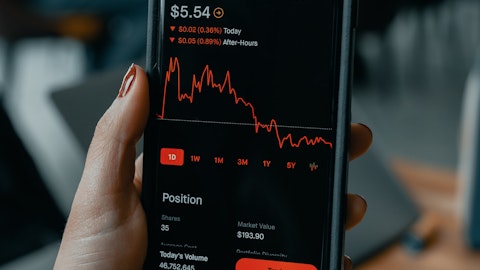In this article, we discuss 10 fintech stocks getting hammered amid economic weakness. If you want to see more stocks in this selection, check out 5 Fintech Stocks Getting Hammered Amid Economic Weakness.
Economic weakness and a lack of short-term catalysts in the fintech sector have called for a re-rating across the space. Credit Suisse analyst Timothy Chiodo said in a report on July 24 that the falling valuations and rapid downgrades in the fintech industry are attributed to higher interest rates, rampant inflation, global macro tightness, geopolitical instability in Europe, and forex headwinds.
While the fintech sector has been plundered by the challenging macro backdrop and a bear market in the tech space, Credit Suisse still believes there are important factors that will aid in the growth of fintech. As the global payments industry is massive, with a compound annual growth rate of about 10% this year and the next, there will be an opportunity for “omni-channel” players to gain market share. Merchants in Eastern Europe, Africa, and Latin America are catching up with global trends and shifting to digital payments and plastic money rapidly. Extremely analogue B2B payment systems are being digitized, and the online overseas remittance market is growing swiftly, with fintechs like Remitly and Zepz leading the way. E-commerce is also fueling the global fintech space. SaaS payments, embedded finance, and commerce-enabled payments will lead the sector in the future.
Timothy Chiodo noted that the fintech sector has been battered since the last quarter of 2021, and the lack of near-term positive catalysts remains a significant overhang. Analysts and market experts have slashed estimates for earnings per share for payment and fintech companies aggressively over the last few months. Significant fintech stocks including Sea Limited (NYSE:SE), Block, Inc. (NYSE:SQ), and PayPal Holdings, Inc. (NASDAQ:PYPL) have declined heavily year to date.

Our Methodology
We selected the fintech stocks that have fallen more than 30% year to date as of July 28 for this list. In addition to the latest analyst ratings, the hedge fund sentiment around the securities as of Q1 2022 is also mentioned, which was assessed using Insider Monkey’s database of 900+ elite hedge funds.
Fintech Stocks Getting Hammered Amid Economic Weakness
10. Repay Holdings Corporation (NASDAQ:RPAY)
YTD Share Price Decline as of July 28: 32.96%
Number of Hedge Fund Holders: 14
Repay Holdings Corporation (NASDAQ:RPAY) was founded in 2006 and is headquartered in Atlanta, Georgia. The company offers integrated electronic payment processing solutions to multiple industries. In addition to that, Repay Holdings Corporation (NASDAQ:RPAY) specializes in credit and debit processing, automated clearing house processing, and instant funding. On May 16, Repay Holdings Corporation (NASDAQ:RPAY) announced a $50 million share repurchase program, which can expire at any time. The stock has plummeted about 33% year to date as of July 28.
On July 22, Credit Suisse analyst Timothy Chiodo downgraded Repay Holdings Corporation (NASDAQ:RPAY) to Neutral from Outperform and slashed the price target to $15 from $20. While the analyst remains bullish on Repay Holdings Corporation (NASDAQ:RPAY)’s longer-term fundamentals and its capacity to expand organically and through continued accretive acquisitions, he downgraded the stock on the back of a more balanced short-term risk/reward amidst a fiscal 2022 guidance “that lacks conservatism”. He also sees the possibility for the macro backdrop to affect Repay Holdings Corporation (NASDAQ:RPAY)’s personal loan business.
According to Insider Monkey’s data, Repay Holdings Corporation (NASDAQ:RPAY) was part of 14 hedge funds at the end of Q1 2022, with combined stakes worth $132.5 million, down from 16 funds in the earlier quarter, holding stakes in Repay Holdings Corporation (NASDAQ:RPAY) valued at $166.8 million. Chuck Royce’s Royce & Associates featured as the leading stakeholder of the company, with 1.86 million shares worth $27.50 million.
Like Sea Limited (NYSE:SE), Block, Inc. (NYSE:SQ), and PayPal Holdings, Inc. (NASDAQ:PYPL), Repay Holdings Corporation (NASDAQ:RPAY) is one of the fintech stocks getting hammered amid economic weakness.
Here is what Baron Small Cap Fund has to say about Repay Holdings Corporation (NASDAQ:RPAY) in its Q4 2021 investor letter:
“That payment company downdraft was also the reason for the decline in the shares of Repay Holdings Corporation this quarter. Repay provides integrated payment processing services for personal loans, auto loans, and receivables management. We like investing in small-cap payments businesses, as we have identified well-positioned, well-managed businesses that have strong market positions and recurring revenue business models. The companies have numerous growth opportunities–organically by further penetrating their segments and through acquisition. In our view, the stocks now are attractively valued as the segment is out of favor.”
9. Nuvei Corporation (NASDAQ:NVEI)
YTD Share Price Decline as of July 28: 47.59%
Number of Hedge Fund Holders: 20
Nuvei Corporation (NASDAQ:NVEI) is a Canadian payment technology company that partners with merchants in North America, Europe, the Middle East, Africa, Latin America, and the Asia Pacific. The stock has slipped about 48% year to date as of July 28. Credit Suisse analyst Timothy Chiodo on July 22 downgraded Nuvei Corporation (NASDAQ:NVEI) to Neutral from Outperform with a price target of $43, down from $85. The analyst cited Nuvei Corporation (NASDAQ:NVEI)’s exposure to the crypto universe, currency movement, and the present macro environment for the downgrade. The analyst believes there is higher downside risk to estimates for 2022 and 2023.
According to Insider Monkey’s data, 20 hedge funds were bullish on Nuvei Corporation (NASDAQ:NVEI) at the end of the first quarter of 2022, down from 24 funds in the earlier quarter. The collective stakes in Q1 2022 increased to $355.5 million from $342.4 million in the prior quarter.
8. SoFi Technologies, Inc. (NASDAQ:SOFI)
YTD Share Price Decline as of July 28: 58.93%
Number of Hedge Fund Holders: 22
SoFi Technologies, Inc. (NASDAQ:SOFI) is a California-based provider of digital financial services. The company operates through three segments – Lending, Technology Platform, and Financial Services. The stock has stumbled about 59% year to date as of July 28. The company filed for a $1 billion mixed shelf offering on July 15, and SoFi Technologies, Inc. (NASDAQ:SOFI) expects to utilize net proceeds for general corporate purposes.
On July 7, Mizuho analyst Dan Dolev lowered the firm’s price target on SoFi Technologies, Inc. (NASDAQ:SOFI) to $7 from $9 and maintained a Buy rating on the shares. The analyst noted that SoFi Technologies, Inc. (NASDAQ:SOFI) is an attractive “FinBank” that is “benefiting from the best of both worlds”. With a 746 average FICO score for personal loans, the company should be resilient to credit cycles, said the analyst, while slashing the price target to account for “more reasonable near-term upside from current levels”.
Among the hedge funds tracked by Insider Monkey, Jim Davidson, Dave Roux, and Glenn Hutchins’ Silver Lake Partners held the biggest stake in SoFi Technologies, Inc. (NASDAQ:SOFI), comprising 21.15 million shares worth $294.40 million. Overall, 22 hedge funds were bullish on the stock at the end of March 2022, compared to 24 funds in the preceding quarter.
Here is what Altron Capital Management has to say about SoFi Technologies, Inc. (NASDAQ:SOFI) in its Q4 2021 investor letter:
“We have been building our position in SoFi over the last two quarters but have not yet written about our thesis until now. SoFi is an online financial technology company that started off refinancing student loans. This segment remains a big part of the company’s business, but they have more recently expanded their products to offer an entire suite of financial services including personal banking, investing, and credit. While their collection of products is still evolving and not yet complete, we believe the company is in the early stages of its inflection. The company nearly doubled its member count over the past year and is growing 50%+ despite its loan refinancing business taking a hit due to the COVID-related loan moratorium. Furthermore, the company is close to obtaining a bank charter through its acquisition of Golden Pacific Bancorp, a community bank based in Sacramento. A bank charter would allow SoFi to take in its own customer deposits, lowering its cost of capital and expanding the company’s breadth of financial offerings.
While SoFi is not the only online banking platform out there, we believe it could take a decent share of the financial services market. Banking is a notoriously sticky business, as the inconvenience and hassle of switching banks prevent consumers from jumping to competitors regardless of cost. This is one of the reasons that traditional banks are one of the few businesses to have truly been disrupted by technology. We think SoFi is well on its way to changing that and creating a new paradigm for the future of consumer banking and financial services.
The factors that will ultimately drive consumer adoption of online banking are cost and convenience. In our opinion, SoFi is best positioned to drive consumers away from the legacy banking model. Their one-stop-shop approach for financial services and their lack of a brick-and-mortar branch network to maintain may eventually propel them into becoming one of the larger players in the banking industry in the United States…” (Click here to see the full text)
7. Upstart Holdings, Inc. (NASDAQ:UPST)
YTD Share Price Decline as of July 28: 82.96%
Number of Hedge Fund Holders: 25
Upstart Holdings, Inc. (NASDAQ:UPST) was founded in 2012 and is headquartered in San Mateo, California. The company operates a cloud-based artificial intelligence lending platform in the United States. On July 8, the stock plummeted about 18% after Upstart Holdings, Inc. (NASDAQ:UPST) announced that it now sees a Q2 net loss ranging between $27 million to $31 million, compared to the prior estimate of either a breakeven quarter or a maximum loss of $4 million. The second quarter revenue is expected to clock in at $228 million, versus the previously issued range of $295 million to $305 million and a Street consensus of $297.64 million. As of July 28, the stock has plunged roughly 83% year to date amid macro pressures and economic weakness.
On July 18, Piper Sandler analyst Arvind Ramnani slashed the price target on Upstart Holdings, Inc. (NASDAQ:UPST) to $25 from $44 and kept a Neutral rating on the shares. Over the coming 6 to 18 months, enterprise technology spending could be pressured as macro challenges prevail, the analyst told investors. The analyst contended that consumer-oriented businesses will possibly be pressurized in Q2 from a clientele that is hit by inflation.
Among the hedge funds tracked by Insider Monkey, 25 funds reported owning stakes in Upstart Holdings, Inc. (NASDAQ:UPST) at the end of Q1 2022, collectively worth $101 million, compared to 20 funds in the earlier quarter with combined stakes valued at $1.3 billion. Vikram Kumar’s Kuvari Partners is a prominent stakeholder of the company, with 296,738 shares worth $32.3 million.
Here is what Vulcan Value Partners has to say about Upstart Holdings, Inc. (NASDAQ:UPST) in its Q1 2022 investor letter:
“Upstart Holdings Inc. is an artificial intelligence (AI) and cloud-based lending platform. Upstart’s stock price has been very volatile, but its value has grown steadily. Last year, the company grew its revenue by over 250% organically, which materially exceeded our expectations. In addition, the company continues to generate robust free cash flow and is launching new products to expand its business. Upstart’s value has increased consistently since we first purchased it. Following our discipline, we have added to our position when its stock price has declined and its price to value ratio has improved, and we have reduced our stake when its stock price has risen faster than its value.”
6. Affirm Holdings, Inc. (NASDAQ:AFRM)
YTD Share Price Decline as of July 28: 72.65%
Number of Hedge Fund Holders: 29
Affirm Holdings, Inc. (NASDAQ:AFRM) is headquartered in San Francisco, California, and the company offers point-of-sale payment technology for consumers, merchant commerce solutions, and a consumer-focused app. The stock has dropped about 73% year over date as of July 28. Stephens analyst Vincent Caintic on July 14 reiterated an Underweight rating and an $18 price target on Affirm Holdings, Inc. (NASDAQ:AFRM) but admitted that the announcement from Amazon about 2022 Prime Day being the largest in its history will likely benefit Affirm Holdings, Inc. (NASDAQ:AFRM)’s GMV. He added that he would not be surprised if Affirm Holdings, Inc. (NASDAQ:AFRM) funded 50% of Prime Day sales, which could almost double his $5 billion Q1 GMV estimate and raise his FY23 annual estimate by 20%.
Among the hedge funds tracked by Insider Monkey, Affirm Holdings, Inc. (NASDAQ:AFRM) was part of 29 hedge fund portfolios at the end of Q1 2022, down from 41 funds in the preceding quarter. Colin Moran’s Abdiel Capital Advisors is a notable stakeholder of the company, with roughly 1.7 million shares worth $78 million.
In addition to Sea Limited (NYSE:SE), Block, Inc. (NYSE:SQ), and PayPal Holdings, Inc. (NASDAQ:PYPL), macroeconomic uncertainty has battered Affirm Holdings, Inc. (NASDAQ:AFRM) stock.
Here is what Bireme Capital has to say about Affirm Holdings, Inc. (NASDAQ:AFRM) in its Q4 2021 investor letter:
“We opened a more idiosyncratic short position in a company called Affirm (AFRM) in Q4.
Affirm is a “Buy Now, Pay Later” (BNPL) company founded by former PayPal CTO and cofounder Max Levchin. They provide installment loans to consumers, partnering with retail companies looking to drive higher sales. They have two primary products: a zero-fee installment loan for consumers with the best credit scores, and a more traditional product with 20%+ interest rates for subprime borrowers. Their stated plan is to disrupt the credit industry with more transparent, lower-fee loans.
At a roughly $28b market cap at the start of 2022, AFRM stock was priced at more than 20x trailing sales, a steep price for a money-losing lender. While their early lead in online BNPL transactions and partnerships with fast-growing retailers like Peloton has fueled significant historical growth, a wave of competition has arrived.”
Click to continue reading and see 5 Fintech Stocks Getting Hammered Amid Economic Weakness.
Suggested articles:
- 10 Important Energy Stocks Making Moves After Earnings
- 10 Stocks That the Russia-Ukraine War Will Affect in the Future
- 10 Stocks Analysts Are Downgrading After Weak Earnings Reports
Disclosure: None. 10 Fintech Stocks Getting Hammered Amid Economic Weakness is originally published on Insider Monkey.





